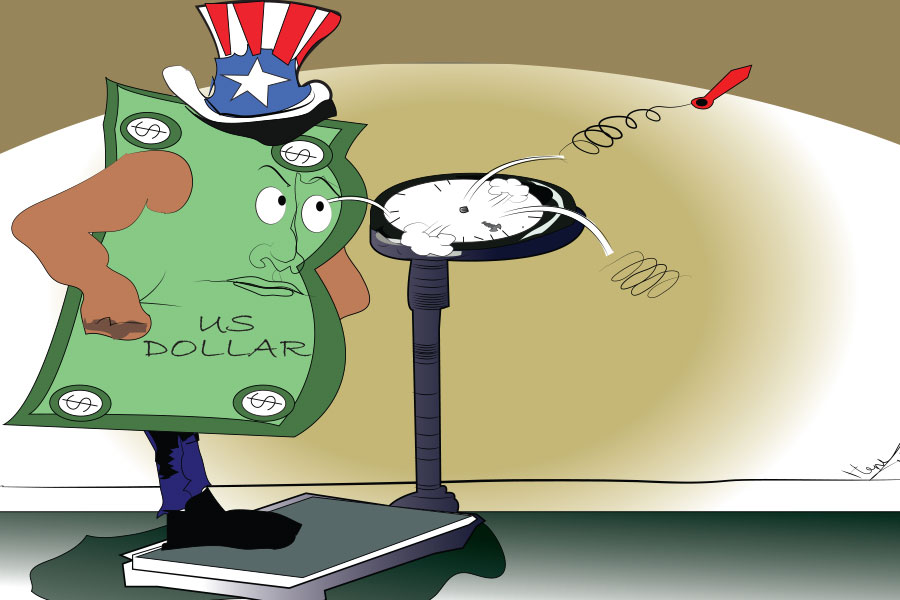
Fortune News | Nov 27,2018
Jun 4 , 2022
By Tigist Solomon
Mental health and, more importantly, depression is a common health problem worldwide, with more cases in well-developed countries. In 2017, mental health data indicated that there were approximately 792 million people with mental health conditions worldwide. Severe or long-term stress, childhood abuse, trauma or neglect, and social isolation are factors for mental disorders. Further investigations and studies are needed to understand the gender difference in mental health.
The issue is less common in sub-Saharan Africa than the rest of the world. But the difference could also be because of more identified and reported cases in developed countries. This is mainly due to more adequate health institutions, professionals and academics available to identify and diagnose people with mental disorders in these countries.
Anxiety, depression, schizophrenia, bipolar disorder, eating disorders and substance abuse disorders are also chronic, which generally requires lifelong follow-up and treatment. With limited health facilities and fewer experts in the field, mental health problems are less identified and reported in sub-Saharan Africa. Moreover, in countries like Ethiopia, traditional and religious practices are advised for people suffering from mental health issues. Traditional therapies are most preferred to all other practices, including medical and counselling services. In fact, in addition to clinical support, non-medical solutions are also practised in well-developed countries like yoga and meditation are almost unheard of in Ethiopia.
Despite the low level of identified and reported mental health problems in sub-Saharan Africa, more and more research and studies on the subject have been carried out very recently to improve the suffering of people with mental health. Countries like the Democratic Republic of Congo and Nigeria are implementing good initiatives to promote mental health care in their respective countries and further in Africa.
Findings from the most recent studies on mental health have been to identify and understand the reported lack of importance attributed to mental health on the continent. New activities such as art, drama, and music focusing on mental health and care are being implemented in sub-Saharan Africa to raise public awareness on the subject and maintain overall mental well-being.
Likewise, universities and health centres on the continent have put in place initiatives to train more psychiatric professionals as well as develop adequate health facilities with well-equipped tools where effective research on mental health is conducted. It is expected that this initiative will eventually promote the discovery of medicines and other similar cures for psychotic problems. The good initiatives of universities and faculties to associate themselves with renowned foreign universities and research centres on mental health should be encouraged. Obviously, the result is positive, although it requires greater attention.
Nowadays, clinical practices for mental treatment are increasingly developed in sub-Saharan Africa and require more devotion to make the service accessible to a wider audience. There is a need to raise public awareness about mental health, including in remote areas and among people with low literacy levels. In order to ensure the good health and general well-being of all human beings, the maintenance of their mental state is fundamental. Subsequently, voluntary non-profit organisations, health institutions, including faculties and research centres, have the responsibility to coordinate well-defined activities and provide a holistic solution to promote the need for mental health care and wellness in sub-Saharan Africa, where clinical remedies have limited attention.
Greater advocacies on mental health using the media, including extensive research focusing both on traditional and clinical care, are needed to protect the mental well-being of people in Africa. Also, there is a need to promote more and more clinical care in mental treatment. Combined with traditional practices, vetted by professionals, clinical care and treatment, will go a long way in addressing the issue of mental disorders across the world.
PUBLISHED ON
Jun 04,2022 [ VOL
23 , NO
1153]


Fortune News | Nov 27,2018

Radar | Sep 10,2022

Radar | Feb 16,2019

Fortune News | Jul 06,2019

Viewpoints | Feb 29,2020

Fortune News | May 23,2020

Editorial | Feb 16,2019

My Opinion | Oct 20,2024

Fortune News | Mar 23,2019

Radar | Jun 15,2025

Photo Gallery | 171745 Views | May 06,2019

Photo Gallery | 161982 Views | Apr 26,2019

Photo Gallery | 151726 Views | Oct 06,2021

My Opinion | 136319 Views | Aug 14,2021





Dec 22 , 2024 . By TIZITA SHEWAFERAW
Charged with transforming colossal state-owned enterprises into modern and competitiv...

Aug 18 , 2024 . By AKSAH ITALO
Although predictable Yonas Zerihun's job in the ride-hailing service is not immune to...

Jul 28 , 2024 . By TIZITA SHEWAFERAW
Unhabitual, perhaps too many, Samuel Gebreyohannes, 38, used to occasionally enjoy a couple of beers at breakfast. However, he recently swit...

Jul 13 , 2024 . By AKSAH ITALO
Investors who rely on tractors, trucks, and field vehicles for commuting, transporting commodities, and f...

Oct 4 , 2025
Eyob Tekalegn (PhD) had been in the Governor's chair for only weeks when, on Septembe...

Sep 27 , 2025
Four years into an experiment with “shock therapy” in education, the national moo...

Sep 20 , 2025
Getachew Reda's return to the national stage was always going to stir attention. Once...

Sep 13 , 2025
At its launch in Nairobi two years ago, the Africa Climate Summit was billed as the f...

Oct 5 , 2025 . By NAHOM AYELE
In Meqelle, a name long associated with industrial grit and regional pride is undergo...

Oct 5 , 2025 . By BEZAWIT HULUAGER
The federal government is set to roll out a new "motor vehicle circulation tax" in th...

Oct 5 , 2025 . By NAHOM AYELE
The Bank of Abyssinia is wrestling with the loss of a prime plot of land once leased...

Oct 5 , 2025 . By BEZAWIT HULUAGER
The Customs Commission has introduced new tariffs on a wide range of imported goods i...